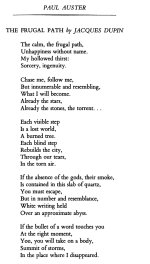I don't hate Baudrillard I just am not super familiar. I have read secondary treatments of simulacra theory and enjoyed them.
I am working on a theory of OPTICRACY, the idea that coordination and selection games are only ever based on IMAGES and APPEARANCES. It will be a rival theory to JEAN BAUDRILLARD so I will have to see what you think, you can help me workshop it, I will include a title page dedication that says THANK YOU VERSION
The Intelligence of Evil, or the Lucidity Pact is a good one to read. It's the last of his 'theory fiction' cycle and his last major book before his death, so it gives you a good overview, plus it's one of the better ones in general and has a good intro from his translator, Chris Turner, covering his whole career. I liked it a lot.
In this impossibility of reapprehending the world through images and of
moving from information to a collective action and will, in this absence
of sensibility and mobilization, it isn’t apathy or general indifference
that’s at issue; it is quite simply that the umbilical cord of representation
is severed.
The screen reflects nothing. It is as though you are behind a two-way
mirror: you see the world, but it doesn’t see you, it doesn’t look at you.
Now, you only see things if they are looking at you. The screen screens
out any dual relation (any possibility of ‘response’).
It is this failure of representation which, together with a failure of action,
underlies the impossibility of developing an ethics of information, an
ethics of images, an ethics of the Virtual and the networks. All attempts
in that direction inevitably fail.
All that remains is the mental diaspora of images and the extravagant
performance of the medium.
Susan Sontag tells a good story about this pre-eminence of the
medium and of images: as she is sitting in front of the television watching
the moon landing, the people she is watching with tell her they don’t
believe it at all. ‘But what are you watching, then?’ she asks. ‘Oh, we’re
watching television!’ Fantastic: they do not see the moon; they see only
the screen showing the moon. They do not see the message; they see
only the image.
Ultimately, contrary to what Susan Sontag thinks, only intellectuals
believe in the ascendancy of meaning; ‘people’ believe only in the
ascendancy of signs. They long ago said goodbye to reality. They have
gone over, body and soul, to the spectacular.

